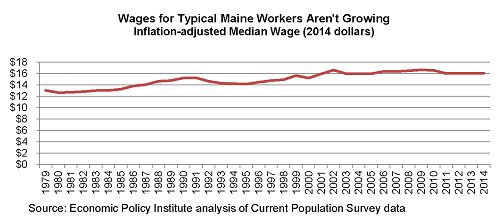“Maine needs policies that increase the wages of workers, not reduce them. We can’t sustain our state’s economy with jobs that don’t compensate workers adequately.”
Good Morning Senator Volk, Representative Herbig, and members of Joint Standing Committee on Labor, Commerce, Research, and Economic Development. I’m Joel Johnson, an economist working at the Maine Center for Economic Policy. I’m here today to testify in opposition to legislation that would effectively reduce wages for Maine workers.
Wage stagnation is one of Maine’s biggest economic challenges. Real wages for Maine’s median worker haven’t grown at all since 2001. Over a longer time period, going back to 1979, Maine’s real median wage has grown only very modestly. Across the nation, growth in productivity has outstripped growth in worker compensation and labor’s share of business output has declined substantially.
Credible research on the economic effects of “Right to Work” shows that these policies reduce compensation for workers—union and non-union alike—and have no impact on employment levels. Please see the attached memo co-authored by two of the nation’s most accomplished labor economists. It explains how to evaluate the credibility of research on the economic impacts of RTW, provides examples of credible research, and summarizes the findings of that research. For example, a 2011 paper by Elise Gould and Heidi Shierholz estimate that wages in RTW states are 3.2 percent lower on average than wages in non-RTW states, even after controlling for a full set of worker characteristics and state labor market conditions. That paper also found that workers in RTW states are less likely to have employer-sponsored health insurance and pension coverage.
Maine needs policies that increase the wages of workers, not reduce them. We can’t sustain our state’s economy with jobs that don’t compensate workers adequately.
Thank you for your consideration and please do not hesitate to contact me with any questions.



